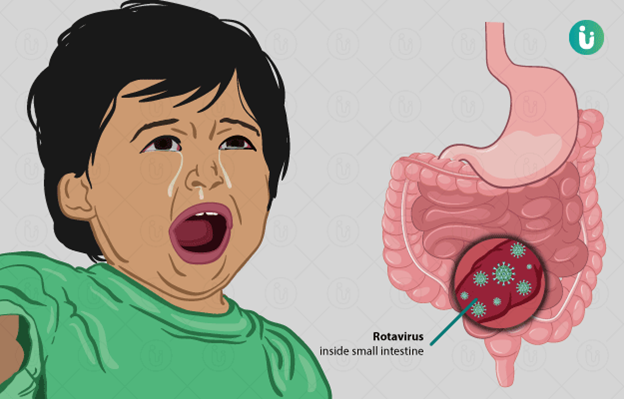The viral pathogen that frequently causes acute diarrhea in young children is:
Rotavirus.
Salmonella organisms.
Shigella organisms.
Giardia organisms.
The Correct Answer is A
The correct answer is choice A: Rotavirus.
Choice A rationale:
Rotavirus is a viral pathogen that frequently causes acute diarrhea in young children. It is highly contagious and is responsible for a significant portion of severe diarrhea cases worldwide. Rotavirus infections are most common in infants and young children, and they can lead to dehydration, especially in developing countries where access to clean water and proper sanitation might be limited.

Choice B rationale:
Salmonella organisms can cause food poisoning and gastrointestinal infections that lead to diarrhea. However, they are more commonly associated with bacterial infections rather than viral-induced acute diarrhea.
Choice C rationale:
Shigella organisms are also bacterial pathogens that cause diarrhea, specifically bacillary dysentery. While they can cause severe diarrhea, they are not the viral pathogen typically responsible for acute diarrhea in young children.
Choice D rationale:
Giardia organisms are parasites that can cause gastrointestinal infections leading to diarrhea. However, they are not viruses, and they are less commonly associated with acute diarrhea in children compared to rotavirus.
Nursing Test Bank
Naxlex Comprehensive Predictor Exams
Related Questions
Correct Answer is D
Explanation
The correct answer is choice D. Birth history.
Choice A rationale:
The heading "Chief complaint" is used to document the primary reason for the patient seeking medical attention, such as their main symptom or concern. This is usually stated in the patient's own words and provides context for the visit, but it does not encompass information about the circumstances of birth or prematurity.
Choice B rationale:
"Review of systems" involves a systematic approach to inquire about the patient's current symptoms or physical complaints across different body systems. It helps to identify any additional issues the patient might not have mentioned initially, but it does not pertain to birth history or prematurity.
Choice C rationale:
"Present illness" is the section where the nurse documents the patient's current health concern, including the details of the symptoms, their onset, duration, and any associated factors. However, it does not encompass information about the circumstances of birth or prematurity.
Choice D rationale:
"Birth history" is the most appropriate heading for recording information about the infant's delivery, including any difficulties during delivery and the fact that the baby was born prematurely. This information is relevant for understanding the infant's medical background and potential risk factors associated with prematurity.
Correct Answer is A
Explanation
The correct answer is choice A: Avoiding use for more than 3 days.
Choice A rationale:
Recommending avoiding the use of decongestant nose drops for more than 3 days is crucial due to the risk of rebound congestion. Decongestant nose drops work by constricting blood vessels in the nasal passages to alleviate congestion. Prolonged use can lead to a phenomenon known as rebound congestion, where the nasal passages become more congested once the medication wears off, causing the person to use the drops more frequently. This can result in a cycle of worsening congestion and overuse of the medication, which can be counterproductive and harmful. Limiting the use of decongestant nose drops to 3 days helps prevent this rebound effect and encourages the use of alternative treatments if congestion persists.
Choice B rationale:
Administering drops until nasal congestion subsides is not the recommended approach. Prolonged use of decongestant nose drops can lead to rebound congestion, as mentioned earlier. Using the drops until congestion subsides might extend their use beyond the safe period and increase the risk of adverse effects.
Choice C rationale:
Keeping drops to use again for nasal congestion is not advised. While it's important to follow the medication's storage instructions, relying on decongestant nose drops for recurring nasal congestion can lead to overuse and rebound congestion. This choice does not address the potential risks associated with prolonged use.
Choice D rationale:
Administering drops after feedings and at bedtime is not a standard recommendation for decongestant nose drops. The timing of administration is not a primary concern in the context of decongestant use. Instead, the focus should be on the duration of use and the potential for rebound congestion.
Whether you are a student looking to ace your exams or a practicing nurse seeking to enhance your expertise , our nursing education contents will empower you with the confidence and competence to make a difference in the lives of patients and become a respected leader in the healthcare field.
Visit Naxlex, invest in your future and unlock endless possibilities with our unparalleled nursing education contents today
Report Wrong Answer on the Current Question
Do you disagree with the answer? If yes, what is your expected answer? Explain.
Kindly be descriptive with the issue you are facing.
